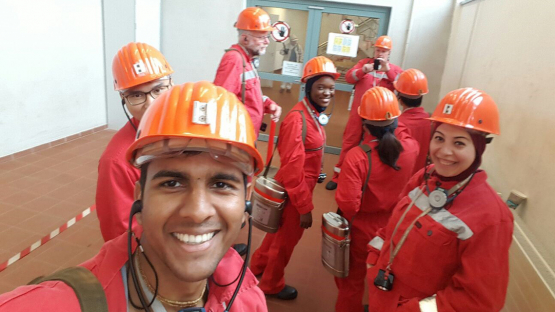In early March, IAEA staff members contributed to an online event jointly organized by the African Commission on Nuclear Energy (AFCONE) and the United States’ National Nuclear Security Administration (NNSA) entitled ‘Women’s Contributions to Building Strong State Systems of Accounting for and Control of Nuclear Material (SSACs) in Africa’. Attended by more than 70 participants from around the world, the event promoted career paths and professional advancement opportunities for African women in the nuclear industry.
“It is a well-known fact that investing in diversity is critical for innovation, performance, and reputation within a business. This applies to the implementation of safeguards as well,” said Therese Renis, Director of Concepts and Planning at the IAEA’s Department of Safeguards. “The IAEA embraces the goals of geographical diversity and gender parity, and IAEA Director General, Rafael Mariano Grossi has set a goal of achieving gender parity among professional staff by 2025.”
Nuclear industry professionals from around the African continent and beyond discussed the challenges of implementing SSACs. An SSAC is a set of arrangements to account for and control nuclear material in the State. The establishment and upkeep of SSACs, set up by State and Regional Authorities, form the basis of a State’s reporting to the IAEA on its nuclear material.
Messaoud Baaliouamer, AFCONE Executive Secretary, emphasized the value of women’s participation in nuclear safeguards and added that, through mentorship opportunities and strong networks, the safeguards community will achieve increased coordination and cooperation. “The paradigm shift to reach gender parity […] will be reached when all decision makers from national, regional and international levels involve women and girls, so that all capacity and potential available is used,” said Baaliouamer.
Other topics included how to build a more diverse workforce within the IAEA and national nuclear authorities; further coordinating security, safety, and safeguarding efforts within the African Union; and other notable national achievements and examples of regional cooperation. The opportunities created to increase the number of women working in the nuclear field, like the IAEA Marie Sklodowska-Curie Fellowship Programme, were also highlighted.
In a session on sharing stories of professional development, Amina Uthman, Nuclear Safeguards Inspector at the IAEA from Nigeria, discussed her experience in joining the nuclear industry, citing the key role that mentorship, training, and professional development opportunities played in her decision.
“As a member of the IAEA’s Safeguards Traineeship Programme, I received mentorship that was invaluable,” said Uthman. “This mentorship put me on the right path, and advised me at turning points in my career. To this day, people who I met on the Safeguards Traineeship Programme continue to be of tremendous support and remain a life-long network.”
More information on the Safeguards Traineeship Programme can be found here. Resources related to the event can be found on the AFCONE website.






